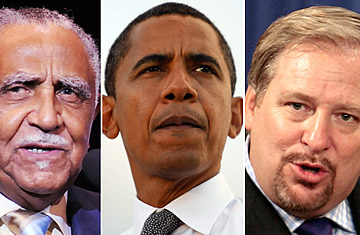
From left: the Rev. Joseph Lowery, President-elect Barack Obama and Pastor Rick Warren
(2 of 2)
Each of Roosevelt's next two Inaugurations featured a Protestant minister and a Catholic priest. Then in 1949, Rabbi Samuel Thurman from Harry Truman's home state of Missouri joined a Baptist pastor and Catholic priest to deliver a prayer at the Inauguration. This was right around the time when sociologist Will Herberg was working on a book called Protestant, Catholic, Jew, arguing that the three religious traditions had separately shaped mid-20th-century America. It seemed both natural and fair, especially in the wake of the Holocaust and the founding of the State of Israel, to make sure that Jews were represented along with Catholics and Protestants in a national ceremony. Rabbis were included in every Inauguration from 1949 to 1973, with Nixon even tossing a Greek Orthodox prelate into the Judeo-Christian mix. (See pictures of a drive-in church.)
As the immigration reforms of the 1960s brought waves of immigrants from Southeast Asia, the Middle East and Africa, religious diversity in the U.S. became more complicated. In an effort to contain the interfaith gathering on the Inaugural dais, Jimmy Carter limited the religious slots at his 1977 swearing in to two clergymen, provoking protests from both Jewish and Greek Orthodox groups. Ronald Reagan narrowed the list even further in 1981, bringing his personal pastor from California to deliver both the invocation and benediction. That move prompted fierce criticism from religious circles, and in 1985 the Inauguration once again included Protestant, Catholic and Jewish religious leaders.
And now Obama's Inauguration will follow the recent pattern of being Protestant-only. In addition, the Inauguration team chose Episcopal bishop Gene Robinson to offer the prayer at Sunday's opening-ceremony concert, and it selected Sharon Watkins, head of the Protestant denomination Disciples of Christ, to deliver the sermon at Wednesday's national prayer service. Which brings the tally of marquee religious figures to: Protestant ministers, 4; rabbis and Catholic priests, 0. (See pictures of the 25 most influential evangelicals in America.)
The Obama camp says that while the swearing-in ceremony may be limited to Protestant clergy, they deserve credit for putting together a diverse cast of supporting characters. "The program of religious leaders that we have assembled for this Inaugural committee has achieved the goal of being one of the most inclusive," says transition spokeswoman Linda Douglass. "Whether at the swearing-in ceremony or the national prayer service or the prayer on the Mall, there are several places where you will hear from all walks of the faith community." The national prayer service that will be held on Wednesday does indeed offer a potpourri of religious diversity, including three rabbis — one each from the reform, conservative and orthodox traditions — as well as Muslim, Greek Orthodox, Hindu and Catholic clergy.
The fact remains, though, that the major speaking slots for religious figures will be filled this year by Protestant Christians. It's possible that Obama aides got so tied up in a search for ideological diversity — Warren is a theologically conservative Evangelical, Lowery a feisty political liberal, Robinson the first openly gay bishop in the Episcopal Church and Watkins the first woman given such a prominent religious spot in an Inauguration ceremony — that they gave up on a goal of ecumenism. It's also likely that at a time when politicians use the phrase "church, synagogue or mosque" and both Hanukkah and Eid are celebrated at the White House, the addition of a rabbi to the lineup would have required balancing with an imam. For a man who will take the oath of office using his full name — Barack Hussein Obama — and spent much of the campaign being dogged by phony rumors that he was a closet Muslim, that might have been a step too far.
Whatever the reason, Obama's Jewish and Catholic supporters may spend Tuesday wondering how to get back on that Inaugural stage in four years.
